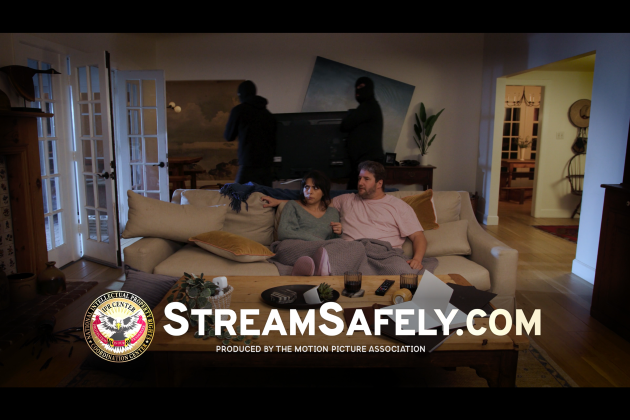MPA Introduces New Anti-Piracy PSAs That Show Personal Risks Users Face When Streaming Illegal Content

The Motion Picture Association is taking a more personal approach to its latest campaign against piracy.
The trade association, along with two other groups, today is launching a new public service campaign aimed at curbing streaming piracy by warning that accessing infringing movies and TV shows can expose users to malware and identity theft.
More from Deadline
In a 60-second spot, a couple settle in for the evening on their couch, locking their doors and cuddling up before the TV. The husband aims the remote at the TV and tells his wife, “Check this out,” as the movie starts playing.
“I didn’t even know this was out yet,” she tells him. “It’s not, but I have a ways,” he says.
“You sure that’s safe?” she asks him. “I have a VPN. We’re good,” he says.
Then the camera goes to a wide shot of their living room, as burglars start rifling through their home, but they are oblivious to it.
“When you pirate content, you are inviting in dangers you can’t even see, like exposing your devices to malware, putting your personal information at risk or surrendering your privacy,” the narrator warns.
Another 30-second spot features Jim Mancuso, director of the National Intellectual Property Rights Coordination Center, watching a crime drama on his phone and warning viewers, “If you watch pirated films and TV shows, you could be exposing yourself to credit card fraud, malware or worse.”
Watch the new anti-piracy PSAs.
The PSAs were produced in partnership with the IPR Center and the Alliance for Creativity and Entertainment, the MPA-aligned group to coordinate anti-piracy efforts worldwide. The spots will be on the IPR Center website and YouTube channel, along with a social media campaign from the center and the MPA. No decision has been made on a campaign in movie theaters, where past PSAs have run.
“This is really appealing to the actual individuals who are going to go ahead and download this and warning them of the dangers — all of the things they can potentially be setting themselves up for,” Mancuso said. “I think that really resonates [to warn users to] think twice. ‘How does this impact me personally?'”
In contrast to some of the past MPA PSAs on piracy, which focused on the impact of infringement on industry jobs, these spots warn of the exposures that users face when they subscribe to websites that purport to offer an array of unauthorized content, including that coming from major legitimate streaming services.
Mancuso added, “Yes, there are financial implications. This type of activity does hurt the industry and it hurts the studios and it hurts corporations and it hurts economic security and prosperity in the U.S. I don’t really know if that really resonates like it should to the American people. This kind of relates on a more personal level. It is really coming right into their living room and kind of highlighting the dangers.”
Jan van Voorn, executive vice president and chief of global content protection for the MPA, said the spots reflect the changing nature of piracy over the past 20 years, from BitTorrent to streaming to subscription models. The latter are services where consumers pay a fee for “all you can eat models, where you have all the TV channels in the world, all the VOD content in the world for all the streaming services, including Netflix, Apple TV, plus Amazon Prime Video, they bundle all that together with sports.”
While Apple TV and Amazon are not members of the MPA, they are members of ACE. Netflix became an MPA member in 2019.
He and Mancuso warned of the criminal backgrounds of the operators of the piracy sites. “It’s a whole kind of game changing in terms of the risk to consumers,” said van Voorn, who also is the head of ACE. “So it’s really driven by that kind of change in piracy and the piracy landscape.” He pointed to a report from the Digital Citizens Alliance, another industry group, in which they subscribed to 55 illegal streaming subscription services with one credit card. Despite having not used their computer for anything else, the credit card had an array of $1,495 in illicit online charges originating in China, Singapore, Hong Kong, and Lithuania.
Best of Deadline
Emma Stone To Receive Palm Springs Film Festival's Actress Award
2023 Premiere Dates For New & Returning Series On Broadcast, Cable & Streaming
2023-24 Awards Season Calendar - Dates For Oscars, Emmys, Grammys, Tonys, Guilds & More
Sign up for Deadline's Newsletter. For the latest news, follow us on Facebook, Twitter, and Instagram.

